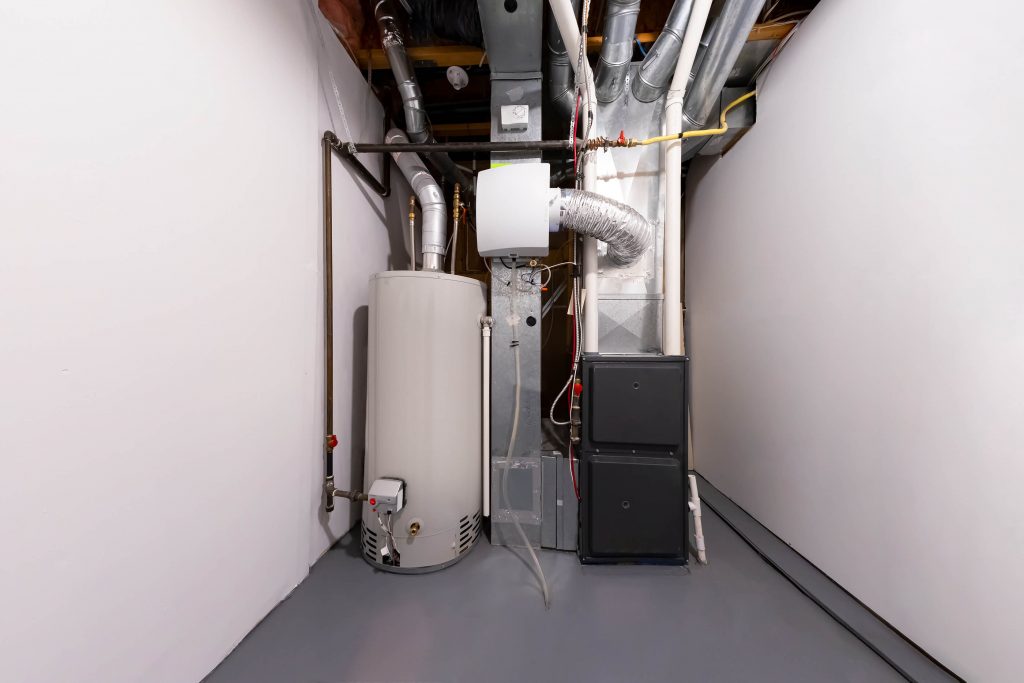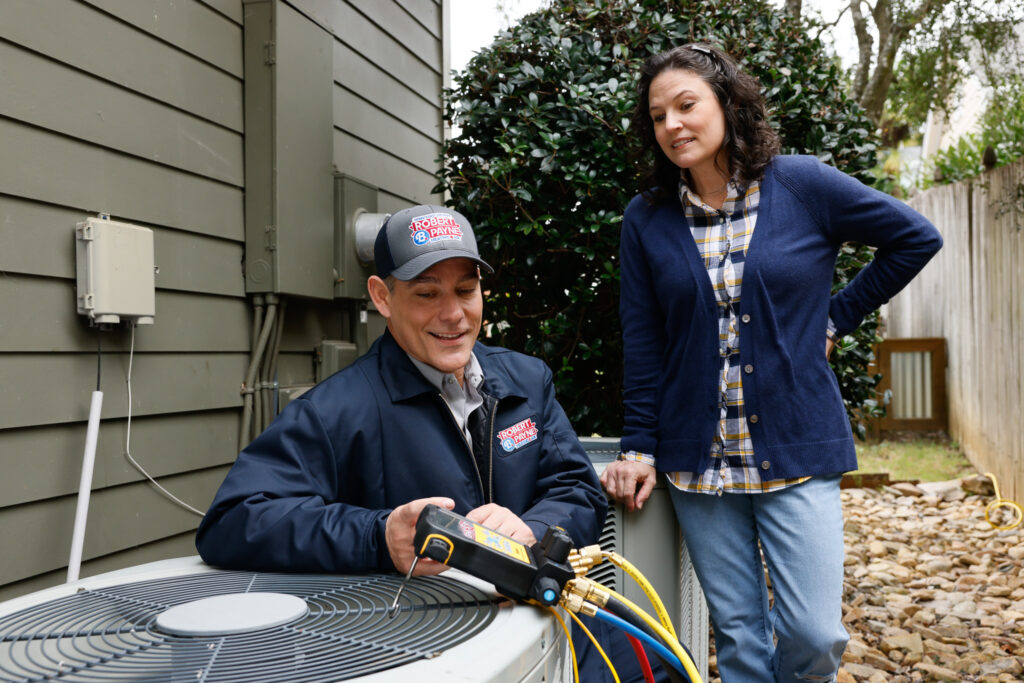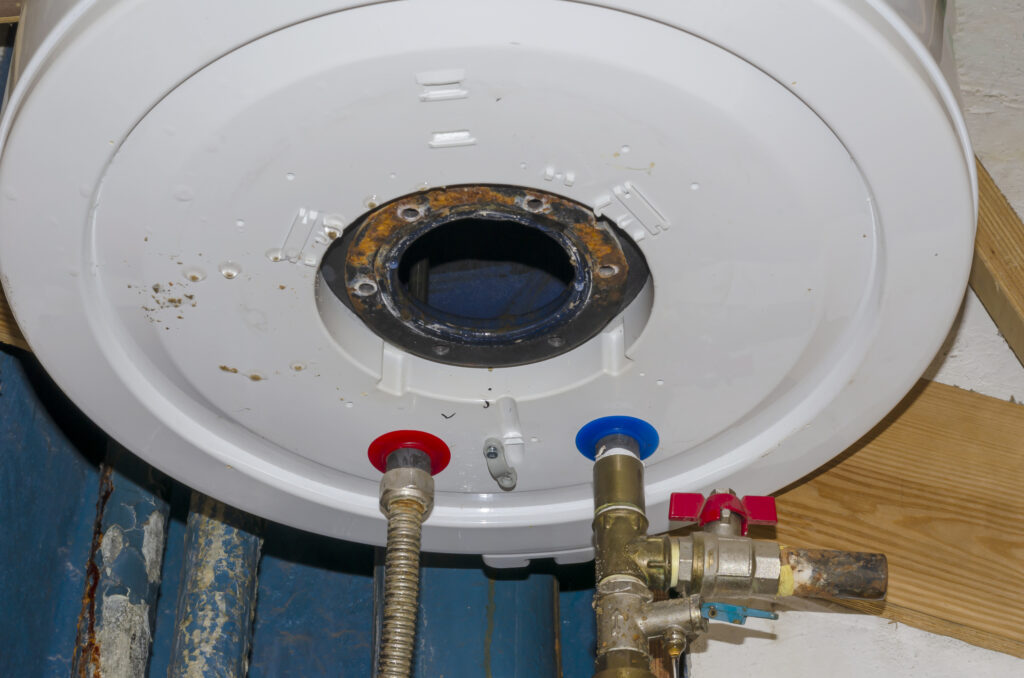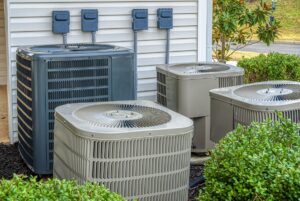A cracked heat exchanger is a major issue that needs to be addressed immediately, as it can pose a serious safety hazard. There are a few ways to tell if your heat exchanger is cracked, and in this article, we will go over some of them.

If you suspect that you have a cracked heat exchanger, contact Robert B. Payne immediately. We are experts in heat exchanger repair and replacement and can help you get your furnace back up and running safely and efficiently.
What is a Heat Exchanger?
A heat exchanger is a device used to transfer heat from one medium to another. The heat exchanger in your furnace consists of a series of metal coils heated by combustion gas and fire. It helps to transfer heat from exhaust fumes or flue gas into your home and protect your household from these toxic fumes.
Primary Heat Exchanger
A furnace that is 70% to 80% efficient uses only a primary heat exchanger. High-efficiency furnaces (90+%) contain both a primary and a secondary heat exchanger. The primary heat exchanger has the hottest flue gas.
Secondary Heat Exchanger
As mentioned earlier, if you have a high-efficiency furnace, it will also have a secondary heat exchanger. The secondary heat exchanger is used to transfer additional heat from the flue gas before it exits the furnace. This helps to increase the overall efficiency of your furnace.
Signs That Your Heat Exchanger May Be Cracked
There are a few signs that you can look out for. Read on to find them.
Is a Cracked Heat Exchanger Dangerous?
A heat exchanger crack can expose your family to carbon monoxide (CO) poisoning. CO is a colorless, odorless, and deadly gas that can cause serious health problems, including death. If you suspect that your heat exchanger is cracked, it is important to contact a qualified HVAC technician immediately to have it inspected and repaired or replaced. Some common signs of CO poisoning include:
-Headache
-Dizziness
-Nausea
-Fatigue
-Visual problems
-Loss of consciousness
How do I Know if I Have a Cracked Heat Exchanger?
It can be hard to tell if you have a cracked heat exchanger, especially if you don’t know what to look for. That’s why it’s important to have your furnace inspected by a qualified HVAC technician at least once a year. They will be able to check for signs of a cracked heat exchanger and repair or replace it as needed. The few signs that you may have a damaged heat exchanger are a lack of heat, persistent flu-like symptoms, and a beeping carbon monoxide detector.
A Beeping Carbon Monoxide Detector
Usually a carbon monoxide detector will go off when it detects a high level of CO in the air. If your carbon monoxide detector is going off, it’s important to evacuate your home immediately and call your local fire department. Once you are safely out of your home, call a qualified HVAC technician to inspect your furnace for a cracked heat exchanger. You should never ignore a beeping carbon monoxide detector!
Flu-Like Symptoms in Your Home
If you or your family members are experiencing flu-like symptoms but there is no flu going around, it could be a sign of CO poisoning. These symptoms include headache, dizziness, nausea, fatigue, and visual problems. Even if your carbon monoxide detector does not go off, if you are experiencing these symptoms, it’s important to evacuate your home immediately. Because children and the elderly are more prone to CO poisoning, it’s important to be extra vigilant if you have young children or elderly family members in your home. You could also invest in two carbon monoxide detectors.
Lack of Heat From Your Furnace
If your furnace is not producing enough heat, it could be a sign that the heat exchanger is cracked. A cracked heat exchanger can prevent the furnace from reaching its optimal operating temperature. This can not only result in a lack of heat but can also cause your furnace to overheat and shut down. If you notice that your furnace is not producing enough heat, it’s important to contact a qualified HVAC technician to have it inspected. If your furnace has a Flame Roll out Safety Detector, it will shut down your furnace if the heat exchanger is cracked.
How Can an HVAC Technician Tell if I Have a Cracked Heat Exchanger
Professional-Grade CO Detector
While your CO detector will only go off if there is a high level of CO in the air, an HVAC technician has special tools that they can use to test for a cracked heat exchanger. This is important because low levels of carbon monoxide are also bad for your health.
Combustion Analyzer
There are many sources of CO in your home. Your stove and water heater also produce CO. So, how can an HVAC technician tell if the CO is coming from your furnace? By using a combustion analyzer. This tool measures the efficiency of fuel burning appliances by determining the temperature and CO and oxygen levels. If the combustion analyzer detects low appliance efficiency, it means there’s a combustion problem. A furnace combustion problem is a sign of a cracked heat exchanger.
Infrared Camera
Another tool that an HVAC technician can use to detect a cracked heat exchanger is an infrared camera. A high-resolution infrared camera can help the technician to see if there are any holes or cracks inside your furnace. The technician slides it inside your furnace and gets a more reliable inspection done than when he simply carries out a visual inspection.
What Can Cause a Cracked Heat Exchanger?
A heat exchanger goes through both heating and cooling cycles. This causes the heat exchangers’ metals to contract and expand. Over time, this can cause the metal to weaken and eventually crack. Although over time, cracks can not be completely avoided, if you maintain your furnace and have it serviced regularly, you can extend the life of your heat exchanger.
There are other causes of a cracked heat exchanger such as:
Age
The age of your furnace is one of the most common causes of a cracked heat exchanger. If you have an older furnace, it’s important to have it serviced regularly. It is also important to check the age of your heat exchanger. Most heat exchangers will last between 15 and 18 years. If yours is close to this age, you may want to have it replaced. A cracked heat exchanger cannot be repaired. It has to be replaced.
AC Water Leak
Since your indoor air conditioning unit is mostly placed on your furnace, any water leaks from your AC unit can cause rust and damage to your furnace. The rust can lead to a heat exchanger crack. If you have an AC water leak, it’s important to have it fixed as soon as possible by a qualified technician.
Dirt And Wear And Tear
It is important that you keep your furnace clean. Otherwise, with time, the dirt can cause wear and tear on your furnace. This, in turn, can lead to a cracked heat exchanger. This happens because dirt can clog air filters, coils, and blowers. When this occurs, air can no longer flow freely through your furnace. The burners then continue to give out heat that nothing is able to absorb. This will lead to a heat exchanger crack.
Natural wear and tear will also cause your heat exchanger to degrade over time. This is why it’s important to have your furnace serviced regularly by a qualified technician.
Poor Air Flow
If there is poor airflow in your furnace, it will cause the furnace to overheat. When this happens, the heat exchanger becomes too hot. This can lead to a crack. There are many things that can cause poor airflow in your furnace. A common cause is a clogged air filter.
Your Furnace is Not The Right Size
Your heat exchanger is more likely to crack if your furnace is not the right size for your home.
Undersized furnace: If your furnace is too small, there will be airflow problems. This causes the furnace to overheat and can lead to a cracked heat exchanger.
Oversized furnace: When your furnace is too big, the furnace will turn on and off frequently. This also causes the heat exchanger to overheat and can lead to a crack. This happens because the frequent on-and-off cycles cause the heat exchanger to expand and contract.
Condensation is another problem that may result from an oversized furnace. When you have an accurately sized furnace, condensation forms in your heat exchanger when you turn on your furnace. This is normal and evaporates after a while. When you have an oversized furnace, because it turns on and off frequently, the condensation has no time to evaporate. This can lead to rust and eventually a cracked heat exchanger.
How Much Will it Cost to Repair or Replace My Faulty Heat Exchanger?
It is not possible to repair a cracked heat exchanger. The only way to fix it is to replace it. The cost of replacing a heat exchanger depends on the model of your furnace, the type of heat exchanger, and whether you have a warranty. The average cost to replace a heat exchanger is a few thousand dollars. It is usually only recommended if your HVAC system is fairly new and has a valid warranty. Also, because the heat exchanger is situated in the middle of your furnace, the labor cost to replace it is usually high. The technician will have to open up your furnace, which is a time-consuming process.
How Can I Avoid a Cracked Heat Exchanger?
The best way to avoid a cracked heat exchanger is to have your furnace serviced regularly by a qualified technician. This will help to ensure that your furnace is running efficiently and will prevent any potential problems. It is also important to keep your furnace clean and free of dirt and dust. You should also check your air filter regularly and replace it when necessary.
During your furnace’s regular maintenance, the technician will clean the burners and check for any potential problems. This is important because it will help to prevent a cracked heat exchanger. If you’re moving into a new home, it’s always a good idea to have an HVAC inspection before you agree to terms. This will help to ensure that your furnace is in good condition and doesn’t have any potential problems. Sometimes, it makes more financial sense to replace your HVAC system rather than replace your heat exchanger.
Do You Suspect You May Have a Cracked Heat Exchanger?
If you think that your heat exchanger may be cracked, it’s important to contact a qualified technician as soon as possible. A cracked heat exchanger can cause serious problems for your furnace and your home. It’s always best to be safe and have your furnace checked by a professional. The team at Robert B. Payne are experts in HVAC systems and can help you to diagnose and fix any problems you may be having with your furnace. Contact us today at 540-373-5876 to schedule a consultation.






